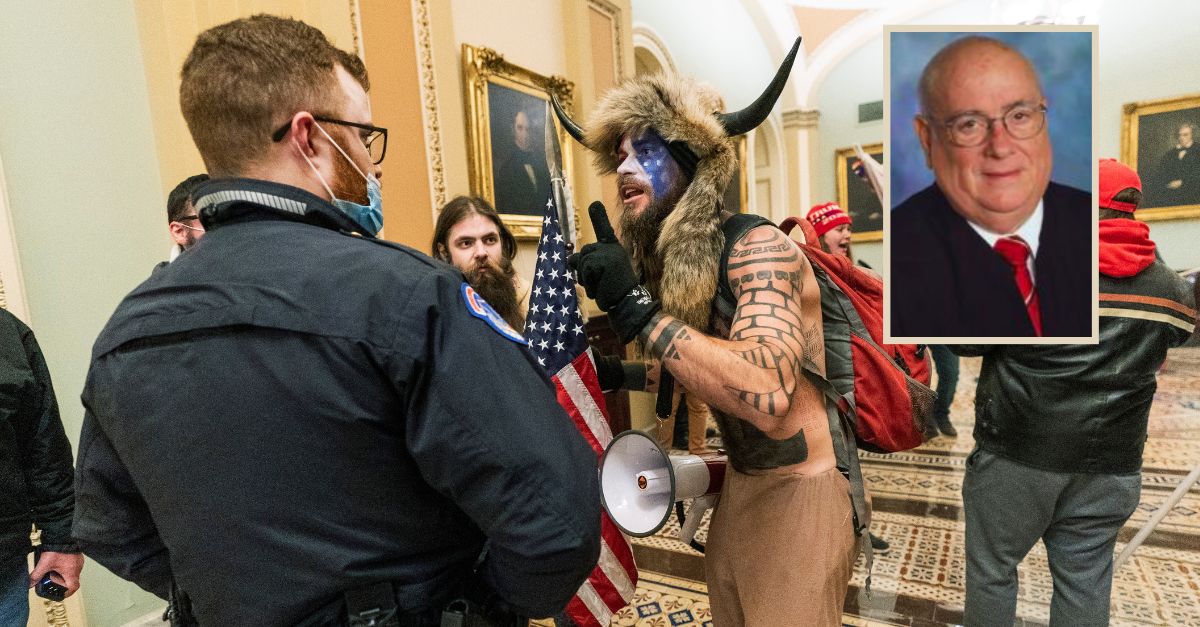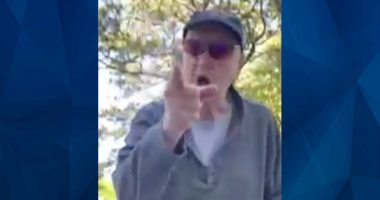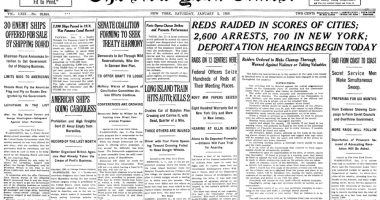
FILE – In this Jan. 6, 2021, file photo, rioters who supported President Donald Trump, including Jacob Anthony Chansley, are confronted by U.S. Capitol Police officers outside the Senate Chamber inside the Capitol in Washington. (AP Photo/Manuel Balce Ceneta, File) Inset: Senior U.S. District Judge Royce Lamberth (via U.S. District Court for the District of Columbia).
The federal judge who once compared the so-called “QAnon Shaman” to Martin Luther King Jr. now says he is dismayed to learn the man he calls “the face of the riot” at the U.S. Capitol on Jan. 6 may not have been sincere in his remorse for his actions that day.
Jacob Chansley, the Arizona man who memorably shouted his way through the Capitol building while wearing a horned helmet and fur pelt, entered the Senate chamber and left a threatening note for then-Vice President Mike Pence, had pleaded guilty in September 2021 to obstructing an official proceeding — a 20-year federal felony — and in November of that year was sentenced to 41 months behind bars.
In April, Chansley filed a motion requesting that Senior U.S. District Judge Royce Lamberth “vacate, set aside, or correct” his prison sentence, which he had already finished serving, save for a term of supervised release. In his motion, which relied largely on closed-circuit television footage aired by Jan. 6 apologist and since-fired Fox News host Tucker Carlson, Chansley argued that the government hadn’t disclosed exculpatory video evidence showing that he wasn’t acting violently while inside the Capitol.
Lamberth, a Ronald Reagan appointee, rejected those claims.
Noting that Chansley had agreed at his plea hearing that he was “in fact guilty,” Lamberth recalled that he had “heavily credited Mr. Chansley’s apparent remorse and acceptance of responsibility” in issuing his sentence. Indeed, Lamberth had praised the defendant’s remarks at his sentencing hearing as “the most remarkable I’ve heard in 34 years” and called his courtroom speech “akin to the kind of thing Martin Luther King would have said.”
Not anymore.
“The Court is disappointed to learn that, through his filings and public statements, Mr. Chansley has recanted the contrition displayed at his sentencing nearly two years ago,” Lamberth wrote in his order. “Such an about-face casts serious doubt on the veracity of any of Mr. Chansley’s claims, here or elsewhere.”
Lamberth rubbished Chansley’s claim that his former attorney Albert Watkins had provided “ineffective assistance of counsel,” which is one of the only bases for an appeal of a conviction based on a plea agreement. Specifically, Chansley had argued that Watkins was ineffective by encouraging him to accept the plea agreement, which contained a sentencing enhancement and appeal waivers, and by failing to demand production of the CCTV videos aired on Carlson’s show prior to his November 2021 sentencing.
“He claims that he suffered prejudice because, absent these errors, he would have received a more favorable plea agreement and the Court would have imposed a lower sentence,” Lamberth wrote. “His argument is wildly speculative, contrary to established caselaw and practice, and devoid of common sense.”
Lamberth said that Watkins’ “strategic choice” to emphasize Chansley’s remorse and acceptance of responsibility at his sentencing was “objectively reasonable.”
Read Related Also: Baltimore block party shooting leaves high school grad and man dead
“The criminal nature of Mr. Chansley’s actions that day, including his decision to leave a note threatening ‘It’s Only A Matter of Time. Justice Is Coming!’ at the heart of the U.S. government, establish the appropriateness of a sentence of at least 41 months’ incarceration,” Lamberth wrote. “In fact, without Mr. Chansley’s apparently unequivocal acceptance of responsibility, the Court is confident that he would have received a higher sentence.”
The judge said that under different circumstances, Chansley might have received a harsher sentence. Noting that the government didn’t have proof that Chansley knew about the noose that had been erected outside the building at the time he wrote the threatening note to Pence, Lamberth said that the government has gathered “terabytes of additional evidence” since then.
“Were Mr. Chansley to be resentenced today, perhaps the government would be able to present such evidence and, if so, the Court would certainly consider such evidence in imposing a new sentence,” the judge wrote.
Notably, Lamberth did disagree with the government’s opposition to Chansley’s motion on at least one notable point. He found that Chansley’s request to vacate his sentence wasn’t moot, despite him having been released from a halfway house in recent months, because he was still serving the supervised release portion of his sentence.
At the end of his ruling, Lamberth all but addressed Carlson’s broadcast directly, saying that he would be “remiss if [he] did not address the ill-advised television show.”
“Not only was the broadcast replete with misstatements and misrepresentations regarding the events of January 6, 2021 too numerous to count, the host explicitly questioned the integrity of this Court — not to mention the legitimacy of the entire U.S. criminal justice system — with inflammatory characterizations of cherry-picked videos stripped of their proper context,” the judge wrote.
He continued:
In so doing, he called on his followers to “reject the evidence of [their] eyes and ears,” language resembling the destructive, misguided rhetoric that fueled the events of January 6 in the first place. The Court finds it alarming that the host’s viewers throughout the nation so readily heeded his command. But this Court cannot and will not reject the evidence before it. Nor should the public. Members of the public who are concerned about the evidence presented in Mr. Chansley’s case and others like may view the public docket and even attend court proceedings in these cases. Those of us who have presided over dozens of cases arising from, listened to hundreds of hours of testimony describing, and reviewed thousands of pages of briefing about the attack on our democracy of January 6 know all too well that neither the events of that day nor any particular defendant’s involvement can be fully captured in a seconds-long video carelessly, or perhaps even cynically, aired in a television segment or attached to a tweet.
Read Lamberth’s ruling, below.
Have a tip we should know? [email protected]









